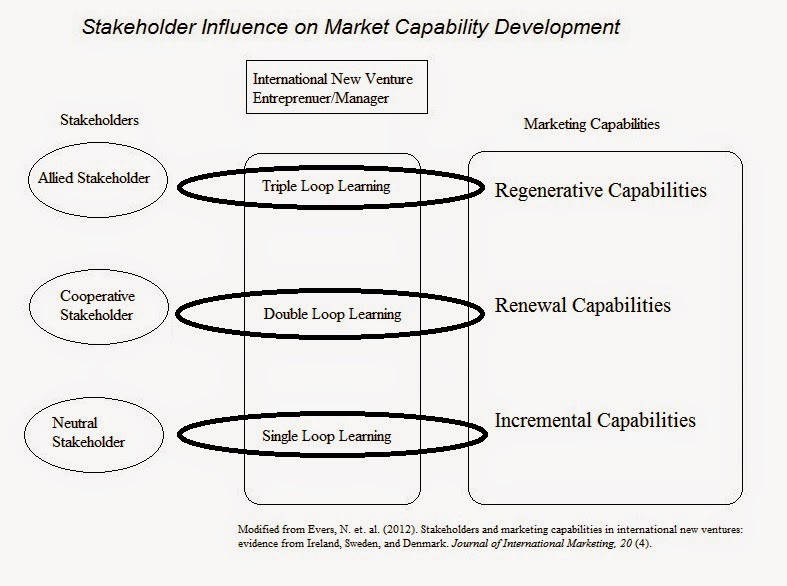International start-ups rely on more than rudimentary
resource allocation as they inherently require collaborative efforts for
effective monetization. Entrepreneurial use of social and business networks to improve
the chances of success is not something new and is part of the process of
pushing innovation. Research by Evers, et. al (2012) brings forward a model of
how stakeholders interact in international marketing development.
The model requires the shifting from market oriented
to stakeholder oriented developmental trajectories. By using the power of
stakeholders it is possible to better understand the market, business
performance, and overall effectiveness through enhanced knowledge management
and innovative solutions. Working in collaboration with key market stakeholders
can raise the possibilities of developing stronger market penetration.
The type of stakeholder groups are as follows:
Neutral Stakeholders: Companies and industry experts
that have their own goals but often share knowledge with each other for
individual development. General knowledge is converted to specific firm use. It
is considered single loop learning.
Cooperative Stakeholders: Cooperative stakeholders that
work together for general improvement and know enough of each other to be
effective. They are separate entities that have their own goals but will
collaborate when it is beneficial. It is considered secondary loop learning.
Allied Stakeholders: Allied stakeholders are highly
motivated businesses and industry stakeholders that work together to create new
products, services and opportunities. They are engage in triple-loop learning
that leads to regenerative possibilities.
Each stakeholder group has different information to
offer that contributes to the developmental process. Many markets are made of
neutral stakeholders that try and understand their market from various
non-aligned parties that provide relevant information. When companies begin to
collaborate around market problems they are able to focus the genre more closely
on business needs.
As companies make a significant commitment with each
other and share tight resources that deliver products/services they are engaged
in allied activities that raise innovative knowledge. We can see this exist
when companies team with suppliers to develop better supply chain platforms for
international delivery or Internet entities that work tightly with other
virtual suppliers to create more effective campaigns.
International marketing development doesn’t work in
a vacuum and requires interested stakeholders to work together to create
something new. Knowledge diffusion and innovation occurs when companies bring
their current capabilities to collaborate with other companies to develop
higher level outputs. The more focused companies are on defined outcomes the
more likely they are able to orientate their efforts.
Evers, N. et. al. (2012). Stakeholders
and marketing capabilities in international new ventures: evidence from
Ireland, Sweden, and Denmark. Journal of
International Marketing, 20 (4).
